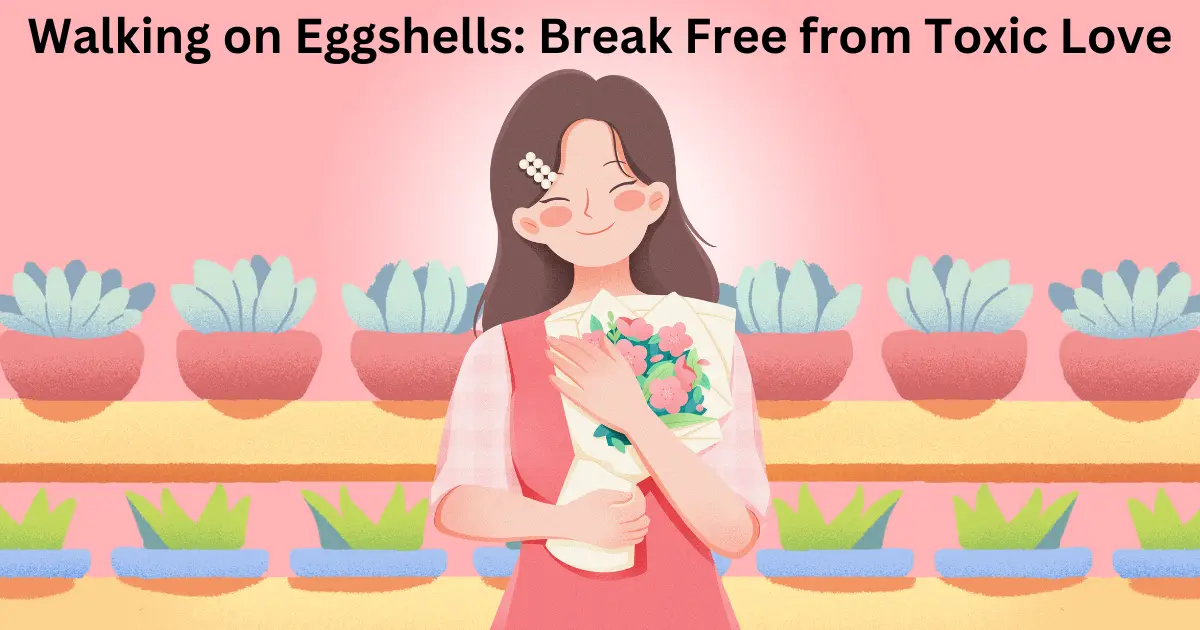Last updated on February 7th, 2026 at 09:43 am
Healthy relationships should feel safe, loving, and supportive. But if you constantly feel like you are walking on eggshells—afraid to say or do the wrong thing because of how your partner might react—it may be a sign of emotional abuse or a toxic relationship.
This article will help you understand what it means to walking on eggshells,” recognize the red flags, and take steps toward healing or leaving such a relationship.
What Does Walking on Eggshells Mean?
The phrase “walking on eggshells” describes the constant fear of upsetting someone, typically a controlling or abusive partner. In such situations, you might:
- Suppress your own feelings.
- Avoid difficult conversations.
- Live in constant tension to avoid triggering anger, criticism, or conflict.
This behavior is common in toxic or emotionally abusive relationships, where one person manipulates or controls the other. Emotional manipulation and verbal abuse are often at the heart of such dynamics, leaving the victim feeling anxious, helpless, and unsure of their self-worth.
Building Successful Personal Relationships
According to a 2023 study by the National Coalition Against Domestic Violence (NCADV):
- Nearly 1 in 4 women and 1 in 9 men report experiencing severe emotional abuse in their intimate relationships.
- Emotional abuse is often underreported because it leaves no physical scars, making it harder to recognize.
These statistics highlight how widespread emotional abuse is, yet many victims struggle to recognize it or seek help due to its invisible nature.
Signs You are Walking on Eggshells
Here are some red flags that indicate you might be in a toxic or emotionally abusive relationship:
- 1. Fear of Your Partner’s Reaction: You’re constantly worried about how your partner will respond to your words or actions.
- 2. Constant Tension: The relationship feels like walking through a minefield—one wrong move, and everything explodes into conflict.
- 3. Emotional Manipulation: Your partner uses guilt, blame, or emotional blackmail to control you.
- 4. Verbal Abuse: Frequent name-calling, insults, or dismissive comments leave you feeling belittled.
- 5. Isolation: You’re discouraged from spending time with friends or family, making you dependent on your partner.
- 6. Fear of Partner’s Mood Swings: You’re always on edge because your partner’s mood changes unpredictably.
Related read: Top 10 Biggest Red Flags in a Guy to Watch Out For

The Emotional Impact of Walking on Eggshells
Living in a toxic relationship can take a serious toll on your mental health. Research has found links between emotional abuse and conditions like:
- Anxiety and Depression: Constant fear and criticism can lead to chronic anxiety or feelings of hopelessness.
- Low Self-Esteem: Over time, you may begin to doubt your worth or feel you are the one to blame.
- PTSD (Post-Traumatic Stress Disorder): Prolonged emotional abuse can lead to lasting trauma.
As psychologist Dr. Susan Forward famously said:
“Emotional abuse systematically wears away at the victim’s self-confidence and trust in their own perceptions.”
How to Stop Walking on Eggshells
If you feel trapped in a relationship where you are constantly walking on eggshells, here are steps you can take to regain control of your life:
1. Acknowledge the Problem
Recognize that you are in a toxic or emotionally abusive relationship. Emotional abuse is just as harmful as physical abuse, even though it’s harder to see.
2. Set Boundaries
Start asserting your needs and setting firm boundaries. Let your partner know that manipulative or abusive behavior is unacceptable.
3. Seek Emotional Support
Connect with reliable friends, family, or a counselor for support and guidance. Support groups for survivors of abuse can also be life-changing.
How to Become Emotionally Strong
4. Consider Professional Help
Couples counseling can address communication problems and unhealthy patterns if your partner is willing to improve.
5. Plan a Safe Exit
Leaving an abusive relationship can be dangerous, which is why having a safety plan is crucial. Reach out to organizations like the National Domestic Violence Hotline or local shelters for guidance and resources.
Tips and Advice for Recognizing and Addressing Emotional Abuse
1. Trust Your Gut Instincts: If something feels off in your relationship, don’t dismiss it. Your intuition is a powerful tool. If you feel uneasy, anxious, or fearful around your partner, it’s worth exploring why.
2. Document the Abuse: Keep a journal of incidents where you feel manipulated, belittled, or controlled. Writing down specific examples can help you see patterns more clearly and provide evidence if you need to seek legal or professional help.
3. Educate Yourself About Gaslighting: Gaslighting is a common tactic in emotionally abusive relationships where the abuser makes you doubt your reality or memory. Learn to recognize phrases like “You’re overreacting” or “That never happened” as potential signs of gaslighting.
4. Practice Self-Validation: Emotional abuse often makes you doubt your worth. Counter this by practicing self-validation. Remind yourself daily of your strengths, accomplishments, and inherent worth.
5. Create a Safety Plan: If you are considering leaving an abusive relationship, plan ahead. This might include saving money, gathering important documents, and identifying safe places to go. Organizations like the National Domestic Violence Hotline can help you create a personalized safety plan.
6. Use Technology Wisely: Be cautious about your digital footprint. Abusers may monitor your phone, email, or social media. Use secure devices and accounts, and consider changing passwords if you suspect surveillance.
7. Lean on Community Resources: Many communities offer free or low-cost resources for survivors of abuse, including counseling, legal aid, and support groups. Don’t hesitate to reach out to local organizations for assistance.
8. Reclaim Your Voice: Emotional abuse often silences victims. Start reclaiming your voice by expressing your thoughts and feelings in safe spaces, whether through journaling, therapy, or trusted friendships.
9. Recognize the Cycle of Abuse: Abuse often follows a cycle: tension building, incident, reconciliation, and calm. Understanding this cycle can help you recognize when you’re being drawn back into harmful patterns.
10. Focus on Small Wins: Healing from emotional abuse is a journey. Celebrate small victories, like setting a boundary, seeking help, or simply getting through a tough day. Every step forward matters.
11. Avoid Self-Blame: Emotional abusers often shift blame onto their victims. Remember, the abuse is never your responsibility. You are entitled to a relationship built on respect and compassion.
12. Explore Mindfulness and Grounding Techniques: Practices like meditation, deep breathing, or grounding exercises can help you manage anxiety and stay present during stressful situations.
13. Reconnect with Your Passions: Emotional abuse can strip away your sense of self. Reconnect with hobbies, interests, or activities that bring you joy and remind you of who you are outside the relationship.
14. Know the Legal Options: If you’re in immediate danger, consider obtaining a restraining order or seeking legal protection. Many countries have laws in place to protect victims of emotional and physical abuse.
15. Build a Support Network: Surround yourself with people who uplift and support you. This could include friends, family, support groups, or online communities of survivors.
16. Practice Assertiveness: Learning to communicate your needs and boundaries assertively can help you regain confidence and reduce the fear of speaking up.
17. Be Patient with Yourself: Healing from emotional abuse takes time. Allow yourself to grieve, process, and heal at your own pace without judgment.
18. Know That Love Shouldn’t Hurt: A healthy relationship is built on mutual respect, trust, and kindness. If love feels painful or exhausting, it’s a sign that something is wrong.
19. Teach Others About Emotional Abuse: Share your knowledge with friends and family. Raising awareness can help others recognize and escape abusive situations.
20. Remember: You Deserve Better: No matter what an abuser says or does, you deserve a relationship that makes you feel safe, valued, and loved.
Powerful Tips to Boost Your Emotional Intelligence
Healing After Leaving a Toxic Relationship
Breaking free from emotional abuse is a courageous step, but the healing journey doesn’t end there. Here’s how to rebuild your life:
- Focus on Mental Health: Therapy can help you process the trauma and rebuild your confidence.
- Reconnect with Loved Ones: Re-establishing connections with supportive friends and family can remind you of your worth.
- Practice Self-Care: Prioritize activities that bring you joy, relaxation, and a sense of purpose.
- Learn from the Experience: Reflect on the red flags and patterns so you can make healthier choices in future relationships.

Key Takeaways
- Walking on eggshells is a clear sign of emotional abuse and a toxic relationship.
- Common red flags include fear of your partner’s reaction, emotional manipulation, and verbal abuse.
- Emotional abuse can lead to anxiety, depression, and even PTSD.
- Setting boundaries, seeking support, and planning a safe exit are essential steps to stop walking on eggshells.
- Healing is possible with the right support, self-care, and professional help.
Final Thoughts
No one deserves to live in fear or constant tension in a relationship. If you feel like you are walking on eggshells, it’s important to recognize the signs and take action. Whether it’s through relationship counseling, seeking support, or leaving the relationship, you have the power to prioritize your well-being and create a healthier future.
Remember, help is always available. You are never truly alone, and your mental well-being is important. Take that first step today toward breaking free and reclaiming your life.



